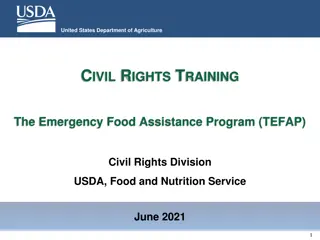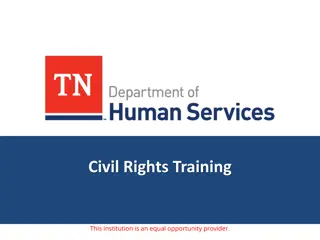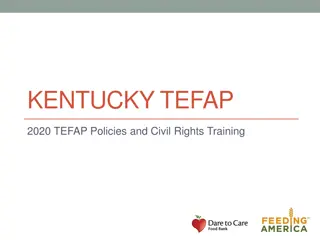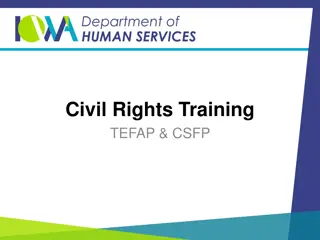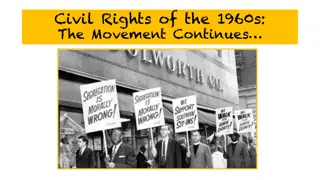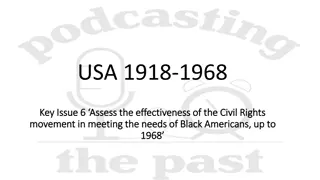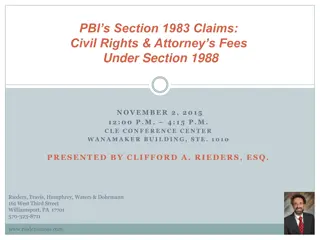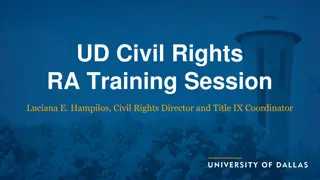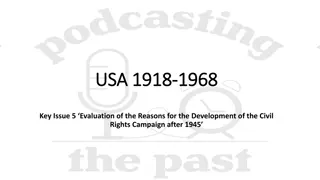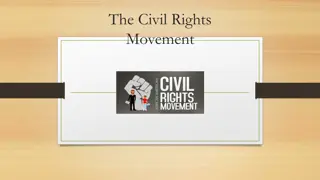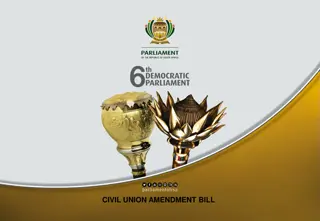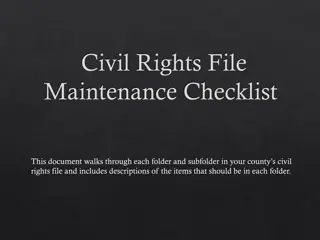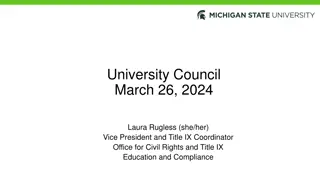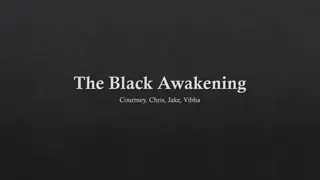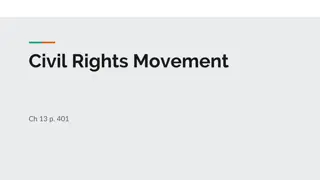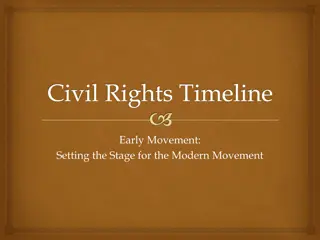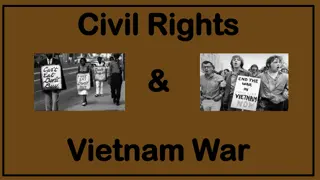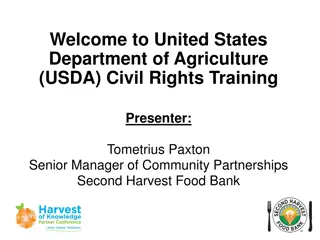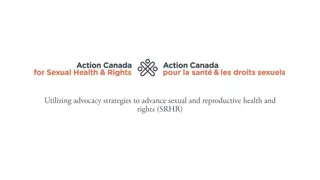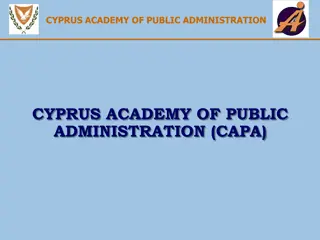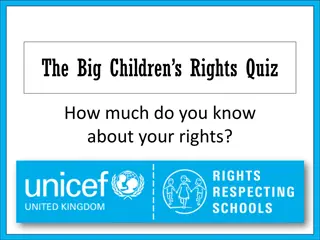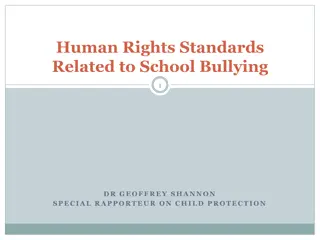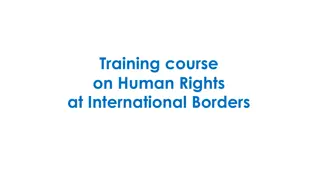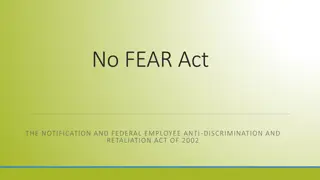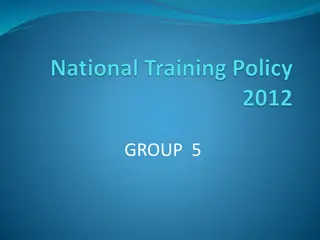Civil Rights Training Overview for Project C.A.R.E.S. After-School Program
Explore essential training topics regarding civil rights, discrimination, protected classes, and program assurances for the Project C.A.R.E.S. After-School Program. Understand definitions, procedures, and responsibilities to ensure a fair and inclusive environment for all participants.
Download Presentation

Please find below an Image/Link to download the presentation.
The content on the website is provided AS IS for your information and personal use only. It may not be sold, licensed, or shared on other websites without obtaining consent from the author. Download presentation by click this link. If you encounter any issues during the download, it is possible that the publisher has removed the file from their server.
E N D
Presentation Transcript
CIVIL RIGHT TRAINING PRESENTATION HANDOUT THE FAMILY INSTITUTE FOR HEALTH and HUMAN SERVICES dba PROJECT C.A.R.E.S. AFTER-SCHOOL PROGRAM
MANDATORY TRAINING TOPICS What is Discrimination? What Is Civil Rights Protected Class Assurances Non Discrimination Statement Complaint Procedures Language Assistance Conflict Resolution Customer Service Note: Annual Civil Rights Certificate: Give copy to Program Director
WHAT IS DISCRIMINATION? To Discriminate means to distinguish single out or make a distinction one person or group of persons from others, either intentionally, by neglect, or by the effect of actions or lack of actions based on the protected bases. Civil Rights Law, unlawful discrimination refers to unfair or unequal treatment of an individual (or group) based on certain characteristics,
Civil Rights Law, unlawful discrimination refers to unfair or unequal treatment of an individual (or group) based on certain characteristics, including: Age Gender Religion Disability Martial Status Sexual Orientation Nation Origin Ethnicity Race
WHAT IS CIVIL RIGHTS? ? The nonpolitical rights of a citizen; the rights of personal liberty guaranteed to U.S. citizens by the 13th and 14th amendments to the U.S. Constitution and by acts of Congress
PROTECTED CLASS A protected class is any person or group of people who are protected against discrimination: - Race - Color - National origin - Marital status - Age - Sex - Disability - Employment or activity funded by the department - Reprisal - Political beliefs - Familial or parental status - Sexual orientation - Income from public assistance
ASSURANCES Program that participate and are approved as Child Nutrition Program sponsors will: not discriminate based on race, color, national origin, age, sex, or disability; operate in compliance with all non-discrimination laws, regulations, instructions, policies, and guidelines; collect data and maintain records; and allow reviews and access to program records.
NON-DISCRIMINATION STATEMENT and Compliant procedures Nondiscrimination Statement In accordance with Federal civil rights law and U.S. Department of Agriculture (USDA) civil rights regulations and policies, the USDA, its Agencies, offices, and employees, and institutions participating in or administering USDA programs are prohibited from discriminating based on race, color, national origin, sex, disability, age, or reprisal or retaliation for prior civil rights activity in any program or activity conducted or funded by USDA. Persons with disabilities who require alternative means of communication for program information (e.g. Braille, large print, audiotape, American Sign Language, etc.), should contact the Agency (State or local) where they applied for benefits. Individuals who are deaf, hard of hearing or have speech disabilities may contact USDA through the Federal Relay Service at (800) 877-8339. Additionally, program information may be made available in languages other than English. To file a program complaint of discrimination, complete the USDA Program Discrimination Complaint Form, (AD-3027) found online at: http://www.ascr.usda.gov/complaint_filing_cust.html, and at any USDA office, or write a letter addressed to USDA and provide in the letter all of the information requested in the form. To request a copy of the complaint form, call (866) 632-9992. Submit your completed form or letter to USDA by: 1. Mail: U.S. Department of Agriculture Office of the Assistant Secretary for Civil Rights This institution is an equal opportunity provider. 1400 Independence Avenue, SW Washington, D.C. 20250-9410; 2. Fax: (202) 690-7442; or 3. E-mail: program.intake@usda.gov
COMPLAINT PROCEDURES Discrimination is prohibited in programs that receive federal financial assistance through USDA. 1. A complaint may be made against these Programs on the basis of race, color, national origin, age, sex, or disability. 2. Allegations can be made verbally or in writing. If they are made verbally, the person to whom the allegations are made must write up the elements of the complaint for the complainant, including contact information. 3. All allegations/complaints must be submitted to the contact information on the Nondiscrimination Statement and Complaint Procedures.
LANGUAGE ASSISTANCE Reasonable effort must be made to accommodate participants with Limited English Proficiency (LEP). Project C.A.R.E.S. will provide translation services to families, and provide an oral interpretation services, if needed.
CONFLICT RESOLUTION Have a written and posted policy dealing with unacceptable behavior and conflicts Try to remain calm Try to explain situation Get help, especially if there are threats or if violence is possible
CUSTOMER SERVICES REQUIREMENTS AND SUGGESTIONS Treat everyone with respect and dignity Promptly respond to concerns and requests Approach difficult/tense situations with a calm tone Avoid casual comments involving race, color, national origin, sex, age or disability, and reprisal Ask for assistance when needed Provide complete and written explanations on eligibility (especially if adverse action is anticipated) Adopt exceptional customer service Use other known effective customer service ideas not listed
ANNUAL CIVIL RIGHTS TRAINING? Annual Civil Rights Training is Mandatory. Project C.A.R.E.S. must annually complete training for all staff that interacts with program applicants or participants and their supervisors.
The Family Institute for Health and Human dba PROJECT C.A.R.E.S. Certificate of Completion is hereby granted to Type Your Name to certify that he/she has completed to satisfaction Civil Rights Training Granted: October 11, 2018 Felicia Brooks Felicia Brooks--Hamilton Hamilton Felicia Brooks-Hamilton, Program Director




